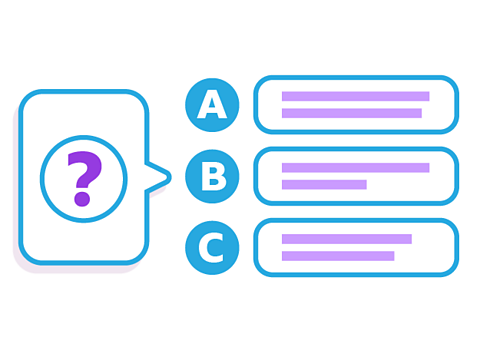Key points about infinitives in Spanish

An infinitive is the ātoā form of a verb, for example to play, to watch, to be.
In Spanish infinitives end in ar, er or ir.
Use the infinitive to give opinions, after modal verbShows possibility, intent, ability, or necessity. Used alongside the infinitive form of the main verb of a sentence. Common examples of modal verbs include can, should, and must., and with certain prepositionA word such as at, for, with, into or from which is usually followed by a noun or pronoun. Prepositions are used to show where something is in place or time..
Infinitives can also be used to talk about what is going to happen in the future.
What are infinitives?
An infinitive is the form of the verb you find in the dictionary, for example to play or to go.
Infinitives in Spanish end in ar, er or ir.
For example:
Sorry, something went wrongCheck your connection, refresh the page and try again. - to speak
Sorry, something went wrongCheck your connection, refresh the page and try again. - to eat
Sorry, something went wrongCheck your connection, refresh the page and try again. - to live
Infinitives are used to give opinions, after modal verbs, and with certain prepositions. They can also be used to talk about what is going to happen in the future.
Using the infinitive after opinion verbs
Use infinitives after opinion verbs such as:
Sorry, something went wrongCheck your connection, refresh the page and try again. - I like
Sorry, something went wrongCheck your connection, refresh the page and try again. - I don't like
Sorry, something went wrongCheck your connection, refresh the page and try again. - I love
Sorry, something went wrongCheck your connection, refresh the page and try again./Sorry, something went wrongCheck your connection, refresh the page and try again. - I hate
Sorry, something went wrongCheck your connection, refresh the page and try again. - I prefer
For example:
Me gusta leer libros. - I like to read books. / I like reading books.
No me gusta nadar. - I donāt like to swim. / I donāt like swimming.
Me encanta comer chocolate. - I love to eat chocolate. / I love eating chocolate.
Detesto ver pelĆculas romĆ”nticas. - I hate to watch romantic films. / I hate watching romantic films.
Prefiero salir con mis amigos los fines de semana. - I prefer to go out with my friends at the weekend. / I prefer going out with my friends at the weekend.
Infinitives and opinion verbs in Spanish - Mini quiz

Translate the following sentence into Spanish:
Me _______ comer pizza.
I like eating pizza.
Me gusta comer pizza.
Translate the following sentence into Spanish:
_____ __ pelĆculas de acciĆ³n.
I prefer watching action films.
Prefiero ver pelĆculas de acciĆ³n.
Modal verbs and the infinitive
Examples of modal verbs in English are ācanā, āmustā or āwantā. Modal verbs express ability, permission, obligation or desire (things you want to do).
High frequency modal verbs include:
- Sorry, something went wrongCheck your connection, refresh the page and try again. - to have to
- Sorry, something went wrongCheck your connection, refresh the page and try again. - to be able to/can
- Sorry, something went wrongCheck your connection, refresh the page and try again. - to want
- Sorry, something went wrongCheck your connection, refresh the page and try again. - must
These modal verbs are all followed by the infinitive.
- Sorry, something went wrongCheck your connection, refresh the page and try again. - to have to
| Spanish | English |
|---|---|
| Sorry, something went wrongCheck your connection, refresh the page and try again. | I have to |
| Sorry, something went wrongCheck your connection, refresh the page and try again. | you have to |
| Sorry, something went wrongCheck your connection, refresh the page and try again. | he/she/it/one has to |
Todos los dĆas tengo que hacer los deberes. - Every day I have to do my homework.
Cuando vuelvas a casa Āætienes que pasear al perro? - When you get home do you have to walk the dog?
- Sorry, something went wrongCheck your connection, refresh the page and try again. - to be able to/can
| Spanish | English |
|---|---|
| Sorry, something went wrongCheck your connection, refresh the page and try again. | I can |
| Sorry, something went wrongCheck your connection, refresh the page and try again. | you can |
| Sorry, something went wrongCheck your connection, refresh the page and try again. | he/she/it can |
No puedo salir hoy. - I cannot go out today.
The impersonal se with a modal verb like se puede can also be used with an infinitive, meaning āone canā.
For example:
En mi pueblo se puede ir a la bolera. - In my town you/one can go to the bowling alley.
- Sorry, something went wrongCheck your connection, refresh the page and try again. - to want
| Spanish | English |
|---|---|
| Sorry, something went wrongCheck your connection, refresh the page and try again. | I want |
| Sorry, something went wrongCheck your connection, refresh the page and try again. | you want |
| Sorry, something went wrongCheck your connection, refresh the page and try again. | he/she/it wants |
ĀæQuieres ir al cine? - Do you want to go to the cinema?
Quiero cenar en un restaurante italiano. - I want to eat in an Italian restaurant.
- Sorry, something went wrongCheck your connection, refresh the page and try again. - must
| Spanish | English |
|---|---|
| Sorry, something went wrongCheck your connection, refresh the page and try again. | I must |
| Sorry, something went wrongCheck your connection, refresh the page and try again. | you must |
| Sorry, something went wrongCheck your connection, refresh the page and try again. | he/she/it must |
No debes comer chicle. - You must not chew gum.
Debo ir al colegio a pie. - I must walk to school.
Using the infinitive with prepositions
The infinitive form of the verb is used after the following prepositions:
- a
- de
- en
- para
- con

Top tip
When you learn the infinitives of these verbs, itās a good idea to learn the prepositions with them. For example, empezar a means to begin or start.
1. Verbs followed by the preposition a and the infinitive
When using the following verbs add a and the infinitive:
| Infinitive | Translation | Example | Translation |
|---|---|---|---|
| Sorry, something went wrongCheck your connection, refresh the page and try again. | to help | Mi madre me ayuda a hacer mis deberes. | My mum helps me do my homework. |
| Sorry, something went wrongCheck your connection, refresh the page and try again. | to learn | Mi hermano aprendiĆ³ a nadar. | My brother learnt to swim. |
| Sorry, something went wrongCheck your connection, refresh the page and try again. | to start, begin | Los alumnos comenzaron a prepararse para el examen. | The pupils started to prepare for the exam. |
| Sorry, something went wrongCheck your connection, refresh the page and try again. | to begin, start | Este fin de semana empezamos a jugar al baloncesto. | This weekend we start to play basketball. |
| Sorry, something went wrongCheck your connection, refresh the page and try again. | to teach | El profe nos enseƱa a hablar espaƱol. | The teacher teaches us to speak Spanish. |
| Sorry, something went wrongCheck your connection, refresh the page and try again. | to do it again | Siempre vuelvo a comer chocolate. | I always eat chocolate again. |
2. Verbs followed by the preposition de and the infinitive
When using the following verbs add de and the infinitive:
| Infinitive | Translation | Example | Translation |
|---|---|---|---|
| Sorry, something went wrongCheck your connection, refresh the page and try again. | to stop (doing something) | Recientemente mi novio dejĆ³ de comer carne. | Recently my boyfriend stopped eating meat. |
| Sorry, something went wrongCheck your connection, refresh the page and try again. | to forget (to do something) | Me olvidƩ de comprar pan. | I forgot to buy bread. |
3. Verbs followed by the preposition en and the infinitive
When using the following verbs add en and the infinitive:
| Infinitive | Translation | Example | Translation |
|---|---|---|---|
| Sorry, something went wrongCheck your connection, refresh the page and try again. | to think about | Pienso en tomar un aƱo sabĆ”tico. | Iām thinking about having a gap year. |
| Sorry, something went wrongCheck your connection, refresh the page and try again. | to be interested in | Tiene interĆ©s en esquiar. | Heās interested in skiing. |
4. Verbs followed by the preposition para and the infinitive
When using the following verbs and expressions add para and the infinitive:
| Spanish | Translation | Example | Translation |
|---|---|---|---|
| Sorry, something went wrongCheck your connection, refresh the page and try again. | itās in order to | Es para ayudarme. | Itās to help me. |
| Sorry, something went wrongCheck your connection, refresh the page and try again. | to have time to | No tengo tiempo para entrenar. | I donāt have time to train. |
5. Verbs followed by the preposition con and the infinitive
When using the following verbs and expressions add con and the infinitive:
| Infinitive | Translation | Example | Translation |
|---|---|---|---|
| Sorry, something went wrongCheck your connection, refresh the page and try again. | to dream about | Siempre sueƱa con ir a una isla tropical. | I always dream about going to a tropical island. |
Video - How to use the infinitive in Spanish
Watch the video to find about how to use infinitives in Spanish.
All infinitives in Spanish end in either 'ar', 'er', or 'ir'
How to use the infinitive in Spanish.
An infinitive is the form of the verb you would find in a dictionary, equivalent to 'to do' or 'to play' in English.
All infinitives in Spanish end in either ar, er, or ir.
For example escuchar, ver and vivir.
You use infinitives to say you do or donāt like doing something:
I like to listen to music - Me gusta escuchar mĆŗsica.
I donāt like to watch films - No me gusta ver pelĆculas.
You can use the infinitive for things you're going to do in the future too.
Iām going to play volleyball this Saturday - Voy a jugar al voleibol este sĆ”bado.
Yusef is going to visit Edinburgh in January - Yusef va a visitar Edimburgo en enero.
Infinitives often come after other verbs, like 'can' or 'must' in English.
I canāt go to school today, Iām sick - No puedo ir al colegio hoy, estoy enferma.
He must clean his room now - Debe limpiar su habitaciĆ³n ahora.
You use the infinitive for things you want to do, too.
I want to go to the beach this summer - Quiero ir a la playa este verano.
He wants to buy a white shirt - Quiere comprar una camisa blanca.
Infinitives are really useful!
Quiz - Infinitives in Spanish
Practise what you've learned about infinitives in Spanish with this quiz.
Higher Tier - Using the infinitive with prepositions
1. Verbs followed by the preposition a and the infinitive
When using the following verbs add a and the infinitive:
| Infinitive | Translation | Example | Translation |
|---|---|---|---|
| Sorry, something went wrongCheck your connection, refresh the page and try again. | to succeed in | Finalmente lleguƩ a jugar en el equipo del colegio. | I finally succeed in playing in the school team. |
| Sorry, something went wrongCheck your connection, refresh the page and try again. | to refuse to | Mi padre se negĆ³ a darme mĆ”s dinero. | My dad refused to give me more money. |
| Sorry, something went wrongCheck your connection, refresh the page and try again. | to get accustomed, get used | Me acostumbro a levantarme temprano. | Iām getting used to getting up early. |

Fill in the gap to complete the following sentence in Spanish:
Finalmente, lleguĆ© __ tener una conversaciĆ³n en espaƱol.
Finally, I succeeded in having a conversation in Spanish.
Finalmente, lleguĆ© a tener una conversaciĆ³n en espaƱol.
Llegar a, āto succeed inā, is followed by the preposition a and an infinitive verb.
2. Verbs followed by the preposition de and the infinitive
When using the following verbs add de and the infinitive:
| Infinitive | Translation | Example | Translation |
|---|---|---|---|
| Sorry, something went wrongCheck your connection, refresh the page and try again. | to try to | Trato de aprender espaƱol. | Iām trying to learn Spanish. |
| Sorry, something went wrongCheck your connection, refresh the page and try again. | to have just done something | Acabo de jugar al fĆŗtbol. | Iāve just played football. |

Translate the following sentence into English:
Alex acaba de comer una pizza.
Alex has just eaten pizza.
3. Verbs or expressions followed by the preposition para and the infinitive
When using the following verbs or expressions add para and the infinitive:
| infinitive | Translation | Example | Translation |
|---|---|---|---|
| Sorry, something went wrongCheck your connection, refresh the page and try again. | to have reason to | Tiene motivo para ganar dinero. | He has reason to earn money. |
| Sorry, something went wrongCheck your connection, refresh the page and try again. | to have permission to | No tengo permiso para ir a la discoteca. | I donāt have permission to go to the disco. |
Now you have learned about infinitives in Spanish why not explore the verb 'to be' in Spanish?
More on How verbs work
Find out more by working through a topic
- count2 of 2
